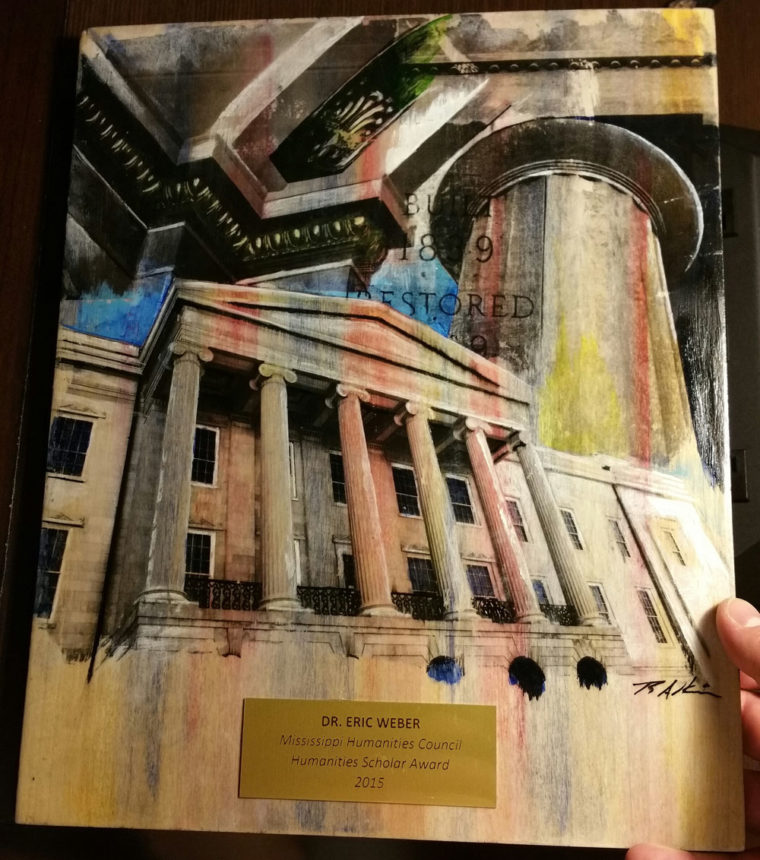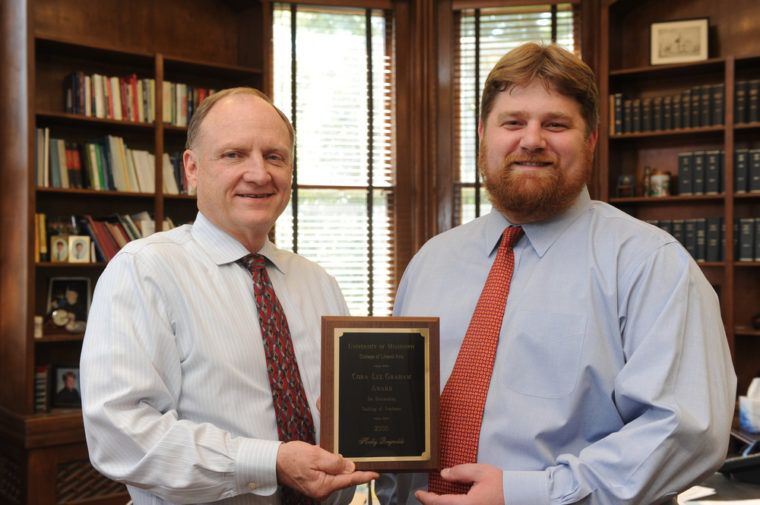Category Archives: Education

This is the beautiful work of art that the Mississippi Humanities Council commissioned to serve as a plaque for the 2015 Humanities Scholar Award I was honored to receive in February. The event and the honor were deeply meaningful and encouraging.
Receiving the 2012 Thomas F. Frist Student Service Award

The next pic is the plaque, featuring the university’s colors.
I also got a photo with then-Chancellor Dan Jones, who has been highly encouraging and supportive. In fact, he wrote one of the endorsements for Uniting Mississippi.
Get comfortable with criticism
A professor from my undergraduate years gave me some of the most important advice I’ve ever received for a career in academia. First, he asked me: “How are you at taking criticism?”
With a bit of a shrug, I said “Ok, I suppose.”
He then explained that “If you can take criticism well, you can go very far.”
He could not be more right. Nonsense criticism needs to bounce off and be forgotten quickly, but most criticisms have substance to learn from. Criticism is a vital means by which we learn and improve. If one can come to want criticism, at least the useful kind, which has some truth to it, then one will continually grow in one’s craft.
“The Law and Morality”
by Cherita Brown, Richard Gershon, and Eric Thomas Weber
Sorry, listening to the audio on this website requires Flash support in your browser. You can try playing the MP3 file directly by clicking here.
July 21, 2015

| Date: | January 29, 2016 |
|---|---|
| Time: | 08:00-09:00 p.m. |
| Event: | Talk on Uniting Mississippi then Book Signing |
| Topic: | Public Philosophy and Leadership |
| Sponsor: |
Philosophical Fridays, University of Southern Mississippi, supported by the MS Humanities Council 601.266.4518 |
| Venue: |
Room TBD, University of Southern Mississippi 601.266.4518 |
| Location: | Hattiesburg, MS 39406 |
| Public: | Public |
If you'd invite me to speak for your event or organization, visit my contact page.

| Date: | October 19, 2015 |
|---|---|
| Time: | 12:00-01:00 p.m. |
| Event: | Book signing and talk on 'Uniting Mississippi' |
| Topic: | Book signing |
| Sponsor: |
University of Arkansas Clinton School of Public Service 501.683.5200 |
| Venue: |
Sturgis Hall 501.683.5200 |
| Location: | 1200 President Clinton Ave Little Rock, AR 72201 |
| Public: | Public |
| Date: | September 9, 2015 |
|---|---|
| Time: | 05:00-06:00 p.m. |
| Event: | Book signing and talk on 'Uniting Mississippi' |
| Topic: | Book signing |
| Sponsor: |
The University Press of Mississippi 601.432.6205 |
| Venue: |
Square Books 662.236.2262 |
| Location: | 160 Courthouse Square Oxford, MS 38655 |
| Public: | Public |

Uniting Mississippi: Democracy and Leadership in the South (Jackson, MS: The University Press of Mississippi, 2015)

Adobe PDF Brochure for the Book
Description
Uniting Mississippi applies a new, philosophically informed theory of democratic leadership to Mississippi’s challenges. Governor William F. Winter has written a foreword for the book, supporting its proposals.
The book begins with an examination of Mississippi’s apparent Catch-22, namely the difficulty of addressing problems of poverty without fixing issues in education first, and vice versa. These difficulties can be overcome if we look at their common roots, argues Eric Thomas Weber, and if we practice virtuous democratic leadership. Since the approach to addressing poverty has for so long been unsuccessful, Weber reframes the problem. The challenges of educational failure reveal the extent to which there is a caste system of schooling. Certain groups of people are trapped in schools that are underfunded and failing. The ideals of democracy reject hierarchies of citizenship, and thus, the author contends, these ideals are truly tested in Mississippi. Weber offers theories of effective leadership in general and of democratic leadership in particular to show how Mississippi’s challenges could be addressed with the guidance of common values.

BUY IT FROM SQUARE BOOKS of Oxford, MS
Endorsements
“The words ‘philosophy’ and ‘practical’ are rarely used together. Using the challenged state of Mississippi as an example, Professor Weber offers clear guidance on how inspired democratic leadership can bring about needed change. There are pearls of wisdom here for both the scholar and the aspiring leader.”
— Daniel W. Jones, MD, professor of physiology and medicine, former dean of the School of Medicine, and former chancellor at the University of Mississippi
“I am often in conversation with groups and individuals around the state who are working hard to improve the lives of Mississippians. Some of the greatest needs in that work are an understanding of our history, the need for a common language to describe where we are in that history, and the creation of a community of practice that shares best practices and ideas. Dr. Weber’s book is an excellent start for supporting this crucial work.”
— Susan Glisson, executive director of the William Winter Institute for Racial Reconciliation at the University of Mississippi
“This book is the beginning of a desperately needed conversation in Mississippi about the future of the state. It addresses an issue that nearly everyone is aware of–the need for high quality education for Mississippians–with an understanding that it must precede rather than flow from economic growth. Anyone interested in education policy in Mississippi should read and consider the case for education in this book.”
— Robert Mellen, Jr., assistant professor and undergraduate coordinator at Mississippi State University
“Book Shows Way Out of Catch-22.”
— Bill Minor, The Clarion Ledger, October 15, 2015.
“Weber moved here eight years ago to teach at the University of Mississippi. Trained in philosophy, he teaches public policy and has mined thinkers ancient and contemporary — particularly Plato and John Dewey — to develop his definition of good leadership. ‘Judicious yet courageous guidance,’ he puts it, a definition from which he draws four cardinal virtues: wisdom, courage, unity and justice. Those are big words, almost fuzzy in their scope. What leader, after all, wouldn’t want some wisdom? But, chapter by chapter, Weber describes the public policies that should emerge from such virtuous beginnings, and the contrast between theory and practice reveals a shortage of each virtue in our local politics.”
— Boyce Upholt, The Clarion Ledger, December 20, 2015.

The College of Liberal Arts at the University of Mississippi kindly selected my teaching for the Cora Lee Graham Award in 2010. Dean Hopkins has since retired. He was a very supportive dean, who on a number of occasions supported my research and service work in significant ways.







 About Me
About Me
This is the interview I gave Cherita Brown of Mississippi Public Broadcasting, MS’s NPR affiliate, and Professor Richard Gershon of the University of Mississippi School of Law on the relationship between the law and morality. Cherita also interviewed me about my forthcoming book, Uniting Mississippi: Democracy and Leadership in the South.
I hope to joint them again soon, as I had a great time. This is just one example of the collaborations I’ve enjoyed with the School of Law at the university, now that I’m an affiliate faculty member there.